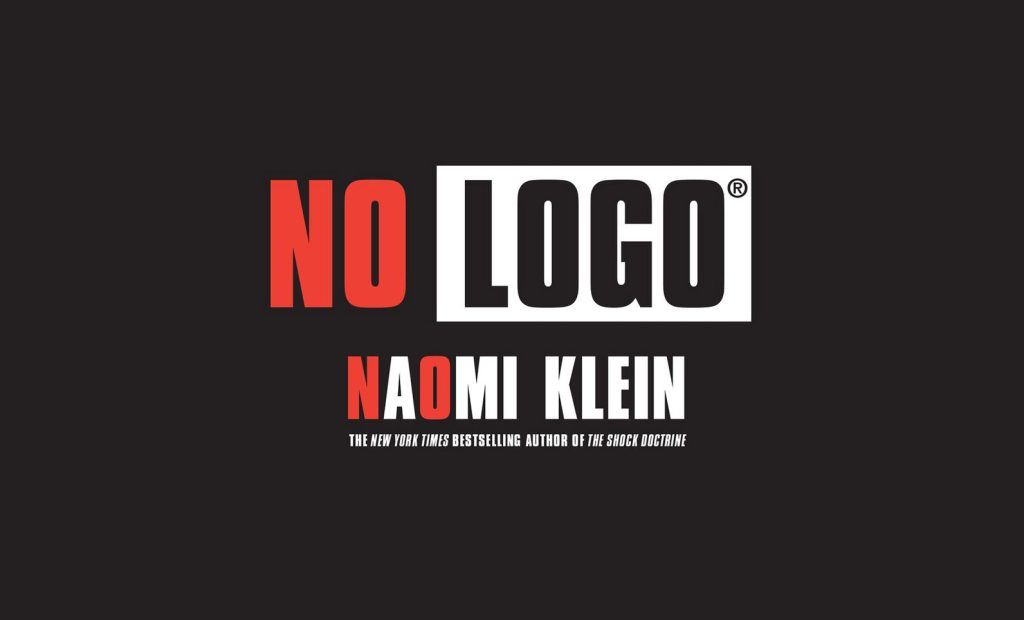I’ve been wanting to get my hands on Naomi Klein’s book “No logo” for some time because of several very interesting recommendations I saw on social networks. The title suggests that it is not a book about brand design. “No logo” is a book about the role of brands in society. A necessary criticism to provoke a vital change in a society that lives under the constant habit of consumption, caused by the actions taken by large multinational brands.
It is a highly recommended book, especially if you are dedicated to branding and brand building, not in its visual facet, but more in the one related to communication, values, identity and brand positioning.
We will now break it down a bit and discuss some interesting facts so that you can get an idea of the content you will find in it.

In the first pages we can see that “No Logo” is a very well documented book. Naomi Klein, its author, has made a thorough study of brands in the globalized world since the beginning of the 20th century, in which she shows us the evolution of brands such as Nike, Disney, Shell, Starbucks or Microsoft, their actions of dubious morality and the movements against them that have arisen as a result of these actions. The phases they have gone through, from creating their own products to ceasing to manufacture them and investing their profits almost exclusively in branding, and the consequences of this change.
The book is divided into 4 parts in which it tells us chronologically how companies and their brands have evolved over the years.
No place
In this section Naomi tells us how brands have gradually become owners of public places. How they have been changing our daily habits, when before we spent the afternoon in a square with friends, and now we have no other option but to spend it under the habits of consumption in shopping centers.
In areas such as education and sports, brands have also flaunted their economic power and have gained a foothold in universities or schools by sponsoring sports equipment, computer devices, and even menus of well-known burger, sometimes vetoing opinions that may harm the brand, hindering freedom of expression.
No options
Multinational brands have been talking about diversity for many decades, it is nothing new, they join to the movement for economic reasons, while on the other hand, in their daily practice they violate fundamental rights, the result is an army of clones in a shopping mall, with a great variety of choice, but all cut with the same scissors. Despite pretending to have a polyethnic image, multinational brands want the opposite, to eliminate national customs and local brands.
Amazon is a clear example of this situation. Its dominant position in the electronic market means that many local, neighborhood stores are forced to close because they cannot compete, causing social deterioration, leaving the streets emptier, and forcing us to go to large shopping areas, where we will have no choice but to buy multinational brands.
No jobs
As mentioned before, throughout history, multinationals decided not to devote more effort to the manufacture of their products in order to focus on the creation and development of their brand. This brought the possibility of delegating their manufacturing to third party companies, detaching them from the brand thanks to the free trade zones, which were seen as a possibility of growth for developing countries such as Indonesia, China, Mexico or Vietnam, but the reality was very different.
A clear example can be seen in Cavite (Philippines) an EPZ (Export Processing Zone), where working conditions are inhumane (working hours are up to 14 hours and wages are below survival level). The real manufacturers of clothes, electronics or toys that we all consume.
No logo
As time went by, all this information came to light and part of society began to mobilize and create groups and associations in different areas of the world, very well organized among them, being able to call simultaneous protest rallies around the world. It is noteworthy that all this took place at the end of the 20th century, when the Internet was just taking its first steps in society.
The militancy of students, activists, associations and various organizations mobilized against large multinationals such as Shell, Nike or McDonald’s in such high-profile cases as Mclibel or Brent Spar. A struggle that fortunately continues today.

As you can see, Naomi Klein guides us through a large amount of objective data and shows that the problem is not really the brands, but the multinationals themselves, which in many cases have a power greater than that of many states. Today the panorama has changed, as the so-called major brands have become less important, but the power of the multinationals continues to grow every day.
Can a brand in the 21st century communicate certain values and in practice transmit the opposite without damaging its reputation? Thanks to the technological means available to us today, it is increasingly difficult, but to a large extent it depends on us.